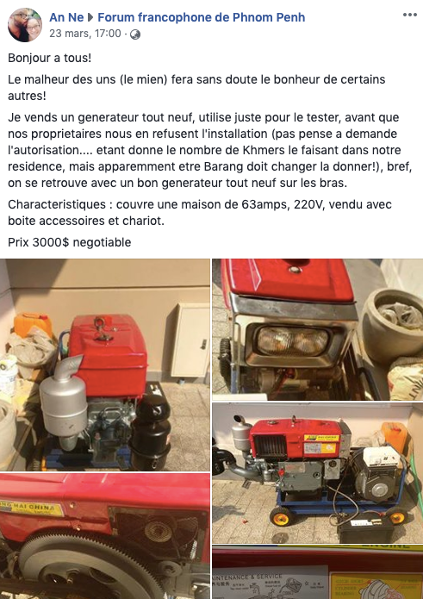
Cambodia on alternating current
For the past week, the national energy producer and supplier Electricité du Cambodge (EDC) has placed the country—and its capital, Phnom Penh—on an alternating current schedule. This system is expected to remain in place for 72 days. The kingdom is currently facing an electricity shortfall of approximately 360 megawatts (MW), or 13% below the 2018 benchmark, which reflects the country's equilibrium in energy supply. The cause: the early arrival of the dry season and the El Niño heatwave.
Residents of Phnom Penh have endured unpredictable days over the past week, particularly in the professional sphere. Each district of the capital—as well as many towns and villages across the provinces—is now alternating power usage. On even-numbered days, some receive electricity in the morning, while others wait until the afternoon—and the pattern is reversed on odd-numbered days. This measure is expected to last until the end of the dry season in late May. However, it does not apply on weekends or public holidays, during which EDC provides regular power distribution.
A problem at the source
The El Niño heatwave, which has affected the country since mid-March, has severely disrupted Cambodia’s electricity production system, which relies heavily on hydroelectric dams. In 2018, Cambodia produced 2,650 MW of electricity locally, enough to meet national demand. The country's seven main dams (Kirirom 1, Kamchay, Kirirom 3, Stung Atay, Stung Tatay, Lower Russey Chrum, Lower Sesan 2) accounted for 50% of this output (1,300 MW). This method far outweighs solar and coal-based alternatives. The current water shortage, caused by the drought, means that the turbines at these facilities can no longer generate sufficient electricity for the population.
This is a worrying situation, according to Morgan Havet, a French expatriate in Cambodia: "According to the data, the El Niño heatwave will peak between April and May—we’re only in March."
Last week, Prime Minister Hun Sen addressed the nation and urged collective understanding and effort.
"Climate change does not only affect Cambodia—it impacts the entire region. We need water to produce electricity. I ask everyone not to waste water, as we will face a long dry season lasting until June," he stated. As a temporary emergency solution, Hun Sen also suggested reverting to generators during outages, “just like in the past.” In response, commercial ads for portable power supplies have appeared on social media, aimed at individuals needing uninterrupted access to electricity. The government is now dealing with a major crisis and has also proposed long-term solutions.

An international call for support
To get through this energy crisis, Cambodia has appealed to its neighboring countries to reassess their electricity exports to the kingdom. Last year, 442 MW were imported from Thailand, Laos, and Vietnam. However, Vietnam, which is currently facing its own serious supply issues, has refused to increase its energy sales. Meanwhile, EDC officials announced that 80 MW will be purchased from Thailand and 10 MW from Laos. Laos—nicknamed the "land of a million elephants"—stated that these 10 MW are part of a 200 MW delivery agreement for the 2019–2021 period.
EDC technicians have been working non-stop, not only along the country's borders. Last week, EDC representatives met with members of the Turkish embassy in Phnom Penh to discuss the pricing and installation terms for a floating power plant in Cambodia—another effort to combat the ongoing shortage.
Electricité du Cambodge is also looking to accelerate development in the solar energy sector. In Kompong Speu province, several solar farm projects are underway. The Tmat Pong plant, which will eventually produce 60 MW, is now being made available to EDC ahead of schedule.
"The plant will generate 20 MW by mid-April and will operate at full capacity by August. The project will therefore be completed four months ahead of the contractual date," the energy provider posted on its Facebook page.
Energy savings are critical during this period of shortage. While it is not a wartime effort, it is clearly a crisis management effort, calling on every citizen to participate. A collective effort, in short, to allow for a more balanced electricity distribution in the kingdom over the coming months.
Thibault Bourru